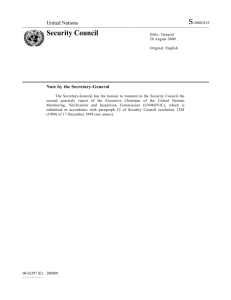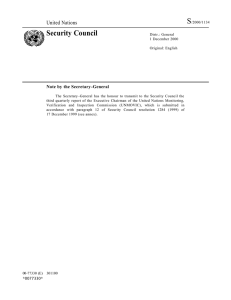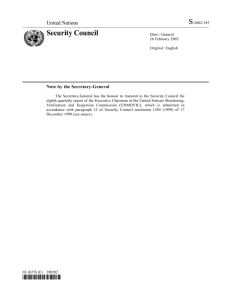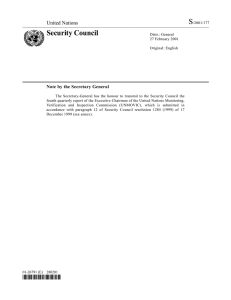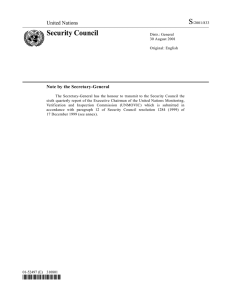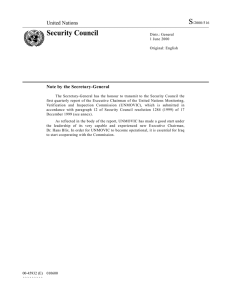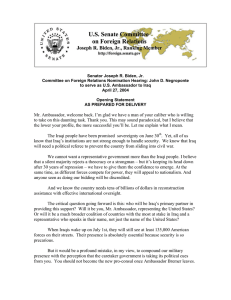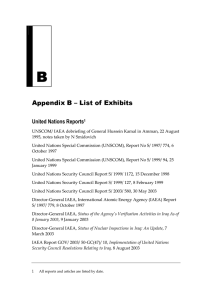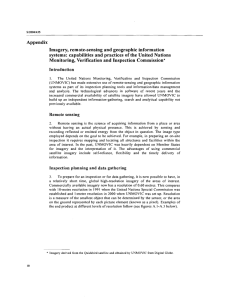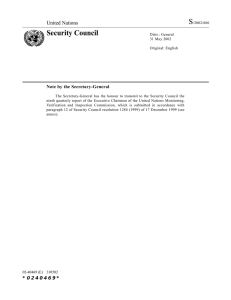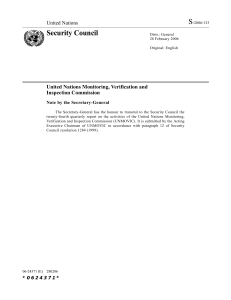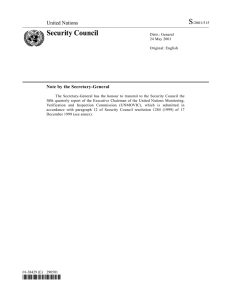S Security Council United Nations Note by the Secretary-General
advertisement
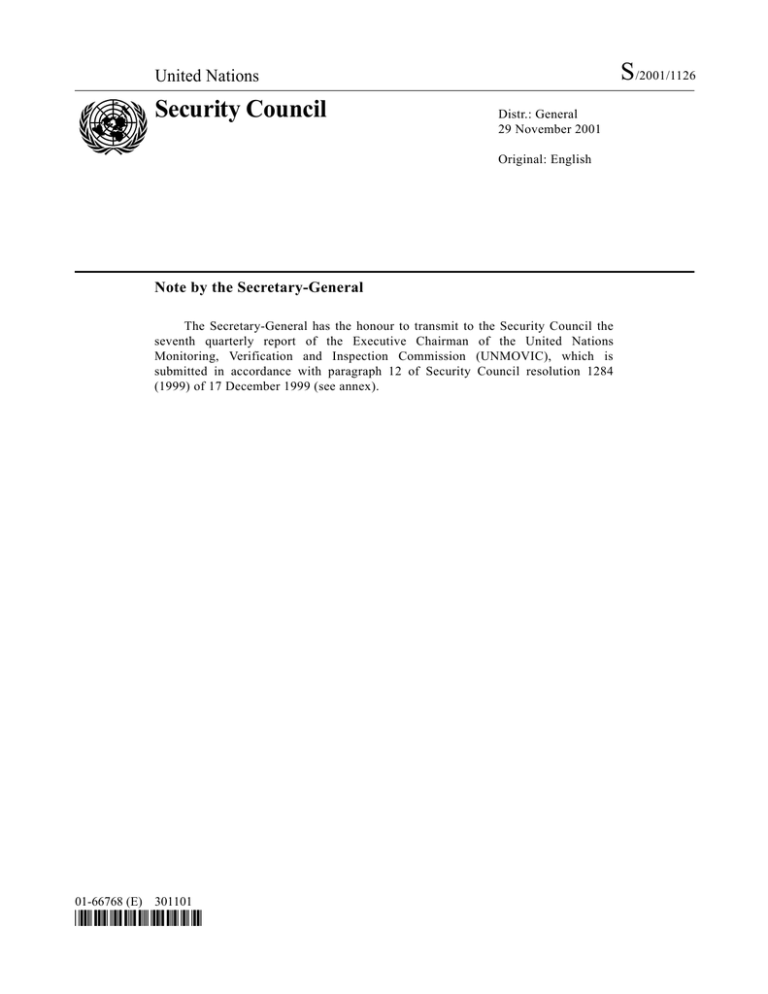
S/2001/1126 United Nations Security Council Distr.: General 29 November 2001 Original: English Note by the Secretary-General The Secretary-General has the honour to transmit to the Security Council the seventh quarterly report of the Executive Chairman of the United Nations Monitoring, Verification and Inspection Commission (UNMOVIC), which is submitted in accordance with paragraph 12 of Security Council resolution 1284 (1999) of 17 December 1999 (see annex). 01-66768 (E) 301101 *0166768* S/2001/1126 Annex Seventh quarterly report of the Executive Chairman of the United Nations Monitoring, Verification and Inspection Commission under paragraph 12 of Security Council resolution 1284 (1999) Introduction 1. The present report, which is the seventha submitted in accordance with paragraph 12 of Security Council resolution 1284 (1999), covers the activities of the United Nations Monitoring, Verification and Inspection Commission (UNMOVIC) during the period from 1 September to 30 November 2001. Briefings and consultations by the Executive Chairman 2. In the period under review, the Executive Chairman has continued his practice of providing monthly briefings to the respective Presidents of the Security Council. He has also kept the SecretaryGeneral and his senior staff informed of the activities of UNMOVIC. In addition, he has visited London and Vienna for consultations with Ministers of the Government of the United Kingdom of Great Britain and Northern Ireland and the Director-General of the International Atomic Energy Agency (IAEA), respectively. In New York, he has also provided briefings to visiting ministers, parliamentarians and government officials. Staffing 3. The UNMOVIC organizational plan (S/2000/292) recognized that it might not be practical or prudent to move to full recruitment in the absence of Iraq’s acceptance of resolution 1284 (1999). UNMOVIC also recognizes the need to keep the Commission lean in the sense of keeping the staffing level no higher than that necessary for the performance of its current responsibilities. A two-stage process was envisaged with the early creation of a core staff at headquarters and a roster of trained experts available to join when circumstances permit UNMOVIC to undertake the full __________________ a 2 The Commission’s six previous reports were issued as documents S/2000/516, S/2000/835, S/2000/1134, S/2001/177, S/2001/515 and S/2001/833. range of tasks mandated to it, including that of inspections. That has remained a guiding principle with respect to staffing. While the paramount criteria in recruitment continues to be securing the highest standards of efficiency, competence and integrity, other considerations have been broad geographical representation and gender balance. As of the end of November 2001, the UNMOVIC core staff, in the professional grades at headquarters, is 46 persons of 24 nationalities of which 9 are women. In addition, there are 180 experts of 36 nationalities, on the roster of trained experts. Within the headquarters core staff a number of positions currently remain vacant. 4. When particular expertise is not required through in-house staff on an ongoing basis, UNMOVIC is engaging the services of short-term consultants. Such consultants assist, for example, in the preparation of revised streamlined declaration formats which Iraq is to submit, in the creation of a consolidated retrievable archival system, and a data classification system, in information technology, and in the preparation of training videos and other tasks to increase and strengthen the Commission’s preparedness. Work programme 5. Paragraph 7 of resolution 1284 (1999) calls for the preparation of a work programme for the discharge of the UNMOVIC mandate not later than 60 days after it has started work in Iraq. This programme, which is to be submitted to the Council, is to include the implementation of the reinforced system of ongoing monitoring and verification and the key remaining disarmament tasks to be completed by Iraq. While the preparation of this programme is dependent upon what is learned from essential rebaselining, already now the Commission can undertake activities that will help draft the work programme. Thus, a major effort at UNMOVIC, involving a large part of its staff and other resources, is the preparation and refinement of a draft inventory of unresolved disarmament issues. A first phase of many months of analytical work has been completed. This has involved a fresh examination of S/2001/1126 Iraqi declarations, inspection reports and other material that the Commission took over from the former United Nations Special Commission. The second phase, which is currently under way, is to merge the issues into interrelated clusters and facilitate the assessment of the overall significance of the individual issues and obtain a better overall picture of Iraq’s weapons of mass destruction programmes, the gaps in knowledge and what remains to be verified. This work will constitute an important element in drawing up the work programme. Non-inspection-related sources of information 6. The imagery that UNMOVIC is receiving, through a commercial satellite imagery contract, continues to be analysed, principally for infrastructure changes at sites in Iraq previously subject to monitoring. The Commission’s experts are able to compare the new images with those already in the Commission’s database and recently catalogued (there are some 15,000). The data are also being used to create line diagrams of sites for inspection purposes. UNMOVIC hopes that Member States will continue to provide it with imagery from their own assets as such assistance provided to date has proven very valuable. Furthermore, analysis of material from multiple sources serves to provide the Commission with a broader and independent assessment capability. 7. The analysis of open-source information continues to be another activity being pursued, particularly in the absence of on-site inspection in Iraq. Open source information may include newspapers, academic journals and other published material, as well as television and radio broadcast monitoring. UNMOVIC has now received the results of an independent study it has commissioned on open source information concerning Iraq’s weapons of mass destruction capabilities in the period following the withdrawal of the former Special Commission inspectors from Iraq. Further open source information reviews are being solicited, particularly of non-English language open source information. In the period under review, the UNMOVIC Senior Officer for Outside Information has continued to liase with Member States. UNMOVIC is grateful to supporting Governments and calls upon other Member States to provide information of relevance to the UNMOVIC mandate. Training 8. The Commission continues to attach a high priority to the continued training of its staff and those on the roster, as part of its overall programme of readiness. In the period under review, emphasis has been placed on advanced training to enhance practical inspection skills; but a further month-long general training course for new personnel is envisaged early next year to widen the pool of available experts. 9. A second advanced training course, on biological weapons issues, took place from 12 to 22 November. Some 20 experts from among the headquarters staff of UNMOVIC and from the roster participated. UNMOVIC has also started training potential chief inspectors and team leaders from its headquarters staff. Several sessions were held in New York in September, October and November. A further advanced training course (missile issues) is planned to take place before the end of the year. The Commission stands in gratitude to those Member States that have supported its training activity. Export/import 10. The UNMOVIC/IAEA joint unit continues to receive notifications from Member States of supplies to Iraq of dual-use items. These notifications allow UNMOVIC to produce a list of items the presence of which, or consumption, in Iraq will need to be verified. Although required to do so by the Council’s decisions, the Government of Iraq has not provided its corresponding notifications. 11. Work continues on a revised handbook to assist Governments in the implementation of the export/ import mechanism approved by Security Council resolution 1051 (1996), particularly following the entry into force of the new list of materials and items to which the mechanism applies (S/2001/560). A web site is also under preparation for this purpose. Other activities 12. Work continues with the electronic scanning, classifying and archiving of material from the former Special Commission, including Iraqi documents, aerial pictures and other media. Combining the database and the archive into one searchable system is also under 3 S/2001/1126 way. UNMOVIC has received the results of a requirements analysis study it had commissioned on its information management needs. A detailed implementation plan is now being executed. Further information management improvements are planned, including better links with the Iraq Action Team of IAEA in Vienna. All these efforts serve to improve ways of retrieving and analysing relevant information from the Special Commission system that contains more than one million documents. 13. The UNMOVIC staff has continued to explore technologies that may be relevant to future inspection and monitoring work. With the support of a Member State, a workshop and missile test firing were held in September to evaluate potential non-intrusive missile sensor technology that may have application in connection with evaluating Iraq’s missile work. The Directors of the UNMOVIC Divisions of Planning and Operations and Technical Support and Training have also recently completed a series of visits in several countries to laboratories and technology companies that may be able to assist UNMOVIC in setting up a network of laboratories for future biological and chemical monitoring work, analysis and sample determination. Readiness 14. Inspectors and other staff in the field cannot be expected to consult numerous resolutions and other texts providing for their rights and duties and Iraq’s corresponding obligations. For this reason, a draft Handbook, describing systematically the policies and technical procedures for inspectors, has been drawn up and is now largely complete. Similarly, the largely new staff at headquarters in New York also have a need of guidelines for their day-to-day work. An UNMOVIC Administrative Manual for this purpose has been completed. It will also form the basis of ground rules for administrative issues for the Commission’s Baghdad Ongoing Monitoring, Verification and Inspection Centre (BOMVIC). 15. The Commission continues to seek to attain a high state of readiness for the start of work in Iraq. New management initiatives to this end include the preparation of checklists for operational readiness. Divisions within UNMOVIC have been tasked with preparing lists of planning and operational issues that can be addressed at this time as well as those issues that will need to be addressed as operations in Iraq commence. In addition to 4 these checklists, quarterly divisional reports also provide the UNMOVIC Administrative Service with staffing, office accommodation and budgetary forecasts. College of Commissioners 16. Mr. Robert Einhorn (United States of America) and Mr. Cong Guang (China) resigned from the College of Commissioners on 15 October and 26 October, respectively. By separate letters dated 26 October (S/2001/1029) and 2 November (S/2001/1064), the Secretary-General proposed to the President of the Security Council that Mr. John S. Wolf (United States of America) and Mr. Li Junhua (China) be appointed to the College. By letters dated 31 October (S/2001/1030) and 12 November (S/2001/1065) the President of the Security Council replied that the Secretary-General’s letters had been brought to the attention of the members and that they had taken note of his proposals. 17. The seventh meeting of the UNMOVIC College of Commissioners was held in New York on 26 and 27 November 2001. The Executive Chairman reported on the work of UNMOVIC since the last session of the College in August. In addition, Directors of various Divisions in UNMOVIC briefed the College on the measures they had taken to prepare for operations in Iraq and on further steps they plan to take. The Chairman also confirmed that, once inspections in Iraq became possible, UNMOVIC would be ready to commence operations without delay. 18. The College welcomed the briefings and held a discussion thereon, as well as on broader issues related to international efforts to prevent the proliferation of weapons of mass destruction by all States and nonState actors. Views were expressed that the events of 11 September had brought a new urgency to those efforts. It was hoped that that urgency might facilitate the efforts of the Security Council for the full implementation of the Council’s resolutions on Iraq. The ongoing efforts by UNMOVIC to clarify certain terms such as “cooperation” and “unresolved disarmament issues” in resolution 1284 (1999) were felt to be helpful in that regard. 19. In accordance with paragraph 5 of resolution 1284 (1999), the Commissioners were consulted on the contents of the present report.
